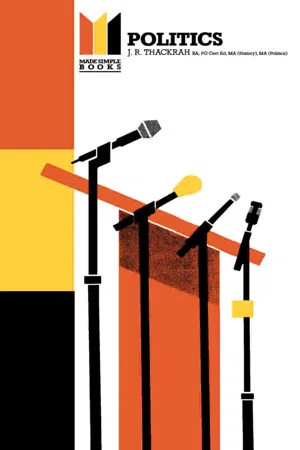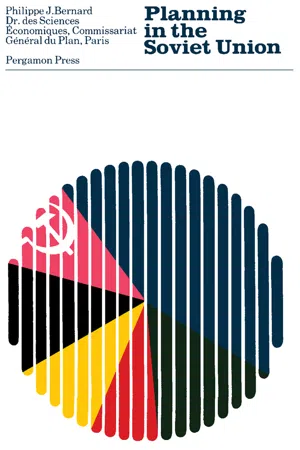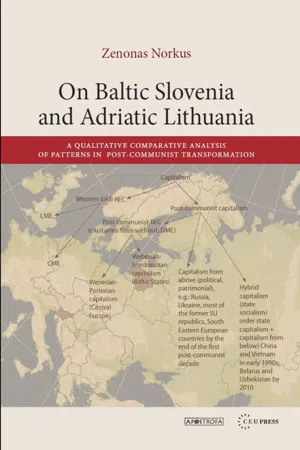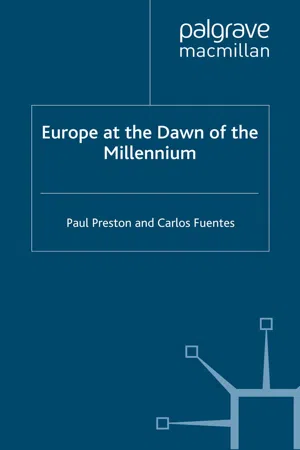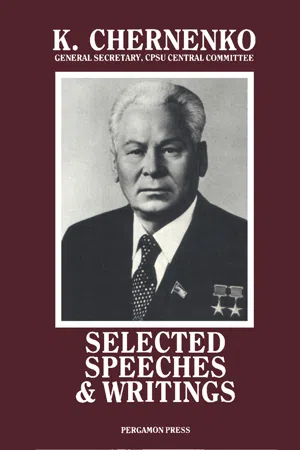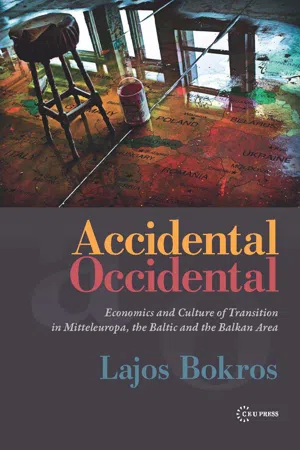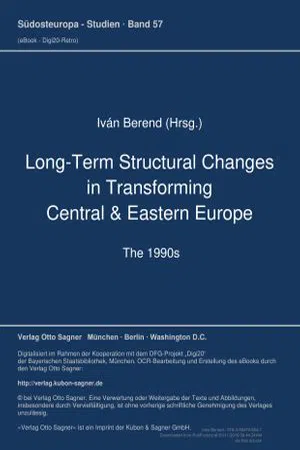Politics & International Relations
Communism
Communism is a socio-economic ideology advocating for a classless society where the means of production are owned and controlled by the community as a whole. It seeks to eliminate private property and establish a system where resources are distributed based on need. Communism has been influential in shaping political movements and governments around the world.
Written by Perlego with AI-assistance
Related key terms
1 of 5
8 Key excerpts on "Communism"
- eBook - PDF
Politics
Made Simple
- J. R. Thackrah(Author)
- 2013(Publication Date)
- Made Simple(Publisher)
Those who support cooperation are thought to be guilty of opportunism and revisionism. In the communist doctrine cooperation is admissable only as a temporary tactic in the exceptional circumstance of a people's war against fascism, national liberation movements against imperialism, and possibly, in a bour-geois-democratic revolution, paving the way for a proletarian revolution. However complex and at times contradictory it may be to construct class models, politics require them. Though not all parties have a class base, most do, and all societies have at least one political party which is clearly supported because it offers special policies in the interest of one class rather than another. Some political parties, conservative and liberal, claim as part of their ideology to be classless or to regard class as irrelevant, but this does not necessarily mean that voting support or policies are any less class-oriented. Although Marx adopts a definition of classes in terms of their position there is a tendency in Marxist writing to dramatize history by speaking of whole classes as though they move upwards or downwards through the social and economic hierarchy. This is perhaps true of indi-vidual members of a class, but it can never be true of the class. Nevertheless, many struggles are seen in terms of class, and thus what some may describe as a 'struggle for control of the means of communication', others regard as a conflict between propaganda and impartiality. The Marxian notion that existence determines consciousness and the relation between social position and ideology cannot easily be maintained. Communism It is not easy to construct a communist society, as Marx well understood, in a world of competing nation-states - at least a communist society that is communist in fact as well as in name. - eBook - PDF
- Philippe J. Bernard(Author)
- 2013(Publication Date)
- Pergamon(Publisher)
β History of the Communist (Bolshevik) Party of the Soviet Union, ' These headings are suggested, notably, by the American scholar D. Comey. * LENIN, Materialism and Empiriocriticism: Critical comments on a reac-tionary philosophy (1908). V. I. LENIN, Collected Works, Lawrence & Wishart, London, Foreign Languages Publishing House, Moscow, 1962. IDEOLOGY AND PLANNING 49 (c) The final element is the plan of action which sets forth the strategy and tactics to be used, in other words, the core of the doctrine which is the essential justification for the existence of a monolithic party whose mission it is to define and implement this plan, in accordance with the broad aims of the political doctrine. It may be argued that the broad aims of Communism, and the values of Soviet society, do not diner basically from the aims and values of Western societies. In so far as one can agree on a definition of these in the West, such aims and values must large-ly be regarded as common to both types of societies, since they spring from the same traditions, in other words the enlightened optimism and the liberal tradition of eighteenth- and nineteenth-century Europe. Communist ideology is original only in its oppo-sition to capitalist economics and capitalist society, which it denounces as being the sole obstacle to achieving those general aims which were mentioned above. When there is any doubt about the line to be taken in a given situation, the simplest solu-tion often seems to be to invoke the example of the opposing system, as a warning to be heeded. Ideology is none the less a powerful instrument, somewhat resembling those religions which start off as heresies, one in opposition to the other, and go on drawing some of their strength from this very opposition, or from combined opposition to an agnostic world. Communist ideology does, however, contain some undeniably positive elements. - eBook - PDF
- Alexander Moseley(Author)
- 2007(Publication Date)
- Continuum(Publisher)
Socialism, succinctly defined, seeks to put control of political, eco-nomic and legal institutions in the hands of society, which typically means the state. Socialism is 100 per cent statism. Most commenta-tors and supporters acknowledge the breadth of definitions of socialism but converge on the collective ownership or control of resources as the key element. It is foremost an economic doctrine, but the primacy of political control over the means and distribution of resources gives the doctrine a momentum to deal with all aspects of life, both to ensure equality in production as well as in access to resources. Lenin’s proclamation is useful to note: ‘Socialists demand the strictest control, by Society and by the State , of the quantity of labour and the quantity of consumption . . .’ 1 Some socialists dis-tance themselves from the actual nationalization of companies, but favour control and direction of the economic life of the community: a position which ironically barely distinguishes them from their trad-itional totalitarian enemies of the twentieth century – fascists and National Socialists. The distinction is, however, academic. Control over a resource entails ownership: ownership is an economic concept, while control is a legal one defining who has access and rights to a resource which can only be recognized socially. Ownership AN INTRODUCTION TO POLITICAL PHILOSOPHY 64 implies the power to exclude some from its use or distribution according to certain criteria. - eBook - PDF
On Baltic Slovenia and Adriatic Lithuania
A Qualitative Comparative Analysis of Patterns in Post-Communist Transformation
- Zenonas Norkus(Author)
- 2012(Publication Date)
- Apostrofa, Vilnius(Publisher)
This is the simplest definition because it permits only an identification of the referents of this concept – the countries where such a system existed – but it says nothing about Communism’s internal nature or about any similarities and differences to societies governed otherwise. A more thoroughgoing characterization of Communism depends on which most similar cases are chosen for the comparison with the actual effects arising from the implementation of communist ideas. First of all, a distinction needs to be drawn between the etic and the emic conceptions of Communism (see e.g. 32 PART I. PAT TERNS OF POST-COMMUNIST TRANSFORMATION Goodenough 1970: 104–119; Harris 1980: 29–45). The emic conception looks at Communism through the prism of Marxism, the very social theory that gave birth to Communism. Such a view can be either critical or apologetic; however, in either case it cannot be said that the social order which emerged in Russia after 1917 was Communism in the sense of Marx’s utopia. He envisioned the free as-sociation of people living amid economic plenty whose primary existential need is creative self-fulfilment (not ever-greater consumption) and who, thanks to this, live without state intervention or monetary transactions. This idea of commu-nism never fitted the actual order in the countries governed by communists. The official ideological doctrine of the communist countries provided an apol-ogetic view of the actual effects of the implementation of Communism. Within these countries Communism was portrayed as socialism, which was the first phase of Communism – the highest and ultimate stage of social evolution. The realiza-tion of Karl Marx’s idea of Communism was thus delayed until some point in the distant future. - eBook - PDF
- A. Brown(Author)
- 2004(Publication Date)
- Palgrave Macmillan(Publisher)
ever-more-distant future); (3) The insistence that socialism consisted not only of state or co-operative ownership and control of the means of production and distribution but also of the type of political system that had been established in the Soviet Union; (4) The operational principle that the Communist Party was, in the words of the 1977 Soviet Constitution, ‘the leading and guiding force of Soviet society and the nucleus of its political system’ (meaning in political practice the CPSU’s monopoly of political power); and (5) The equally crucial modus operandi of ‘democratic centralism’ as the organisational basis of societal and, more specifically, intra-party life, involving strict discipline and hierarchical subordination within the ruling party and exceedingly narrow limits on public debate. There was often, to put it mildly, a tension between the Marxism of Marx (itself, of course, a subject of protracted debate and far from free of ambiguity) and codified Soviet Marxism–Leninism. Thus, Marx’s materialist conception of history meant that the economic develop- ment of society and, in particular, changes in the modes of production (which gave rise to the division of society into classes and produced the class struggle) had explanatory primacy over ideas and institutions. Ideas acquired influence or hegemony because they reflected the inter- ests of the ruling class. Although state institutions had a limited auton- omy, they constituted the superstructure of society as distinct from its more fundamental economic base. While Soviet ideology embraced that doctrine, parts of it contradicted it. The heavy emphasis in ortho- dox Soviet doctrine from Stalin’s time onwards on the authority of the state – together with the enormous power wielded by party and state political institutions in political practice – remained at odds with the Marxist historical materialism that was, nevertheless, taught in all Soviet higher educational institutions. - eBook - PDF
- Konstantin Chernenko(Author)
- 2016(Publication Date)
- Pergamon(Publisher)
34 A qualitatively new political system of society came into being. The Communist Party, the party of the working class, now held the reins of power. Its aims, socio-economic and political tasks (improvement of the working people's material well-being, social and ethnic equality, social security, the responsibility of society for the destiny of each and the responsibility of each for the destinies of all, respect for labour, and so on) were fully consistent with the goals and tasks of the trade unions. This is perhaps the clue to the amazingly strong ties which have existed between the Communist Party and the trade unions of the USSR for many decades now. The political system of socialism is based on real involvement of the working people in the management of the affairs of state, primarily in the management of production. The trade unions affiliating scores of millions of working people on the occupational principle serve as one of the basic components of the general system of socialist democracy. Thus, from an instrument for struggle against the capitalists and the bourgeois COMMUNISTS IN THE USSR 147 state they have turned into a powerful constructive force building socialism and Communism. Lenin profoundly and comprehensively substantiated the role and significance of the trade unions in the political system of Soviet society. The trade unions, he pointed out, are an organization for education, an organization for involvement, for training, that is, they are a school—a school of administration, a school of economic management, a school of Communism. 35 Lenin's ideas are the platform of all activities of the Soviet trade unions. Along with the Party the trade unions defended the young Soviet republic in the years of the Civil War and foreign military intervention, and struggled to build socialist industry, socialist agriculture, a new socialist culture. - eBook - PDF
Accidental Occidental
Economics and Culture of Transition in Mitteleuropa, the Baltic and the Balkan Area
- Lajos Bokros(Author)
- 2013(Publication Date)
- Central European University Press(Publisher)
(See footnote 14.) 12 Accidental Occidental In this book I concentrate on a very specific historical variation of the command economy and society, namely Soviet Communism. 10 The nas-cent Soviet Union was never conceived as a traditional, immovable soci-ety and its economy was not based on simple reproduction and subsis-tence without the accumulation of surplus. Just the opposite: the most important driving force and source of legitimacy for Soviet Communism was a special ideology which praised economic growth and material abundance —not necessarily for the individual consumer but for society as a whole. It intended to be a very radical departure from anything tradi-tional. In political sense it strove and pretended to be ultra-modern. There were at least three elements in this ideology—“Marxism– Leninism”—which implied the need and possibility of unrestricted eco-nomic growth . First, Communism was defined and always justified as superior to capitalism because it claimed to liberate the proletariat—the class created by and oppressed in capitalism—from “wage slavery.” Sec-ond, Communism was declared more efficient than capitalism because it was going to be based on society-wide conscious planning rather than an inherently wasteful market . 11 Third, while market capitalism was based on profit and material gain as a primary driving force of most private eco-nomic activity including, first and foremost, productive investment, in Communism the profit motive was to be completely eliminated and re-placed by the universal aspiration to satisfy directly the material needs of society in a close-to-perfect way. 12 10 When it started in post-revolutionary Russia, Soviet Communism was clearly conceived as a non-market system not only for ideological reasons but also for it had been born out of war. - eBook - PDF
- Iván Berend(Author)
- 1997(Publication Date)
- Peter Lang International Academic Publishers(Publisher)
The societies of the countries which introduced Communism were atomized by the revolution (Russia) or by the war (Central Eastern European countries), during which they also lost a substantial number of their former upper and middle classes, as well as their better educated people. Industrialization and urbanization moved vast masses of peasants to the cities, turning them into workers and a new intelligentsia, and produced a communist version of a mass society. The overall modernization and the upward social mobility were an important way of legitimizing communist regimes, even in such countries where, as in Poland, traditionally anti-communist and anti-Russian sentiment prevailed. Communist regimes referred in their discourse to the ideas of a radiant future, a classless society, social justice, the common cause of workers all over the world, and so on. These ideas found their way only to young zealots, and only in the early stages of the period of real socialism. In a more practical way, identities and solidarities were built not so much with words, as with actual social policies. These consisted, especially after the phase of mass terror, on massive income redistribution and on providing basic material security, albeit on very low level These polices were realized thorough the bureaucratic paternalism of the state As Daniel Chirot aptly observed, Communism built its own kind of corporatist society, in which the place of work - the state enterprise - became the main provider of social security .1 ’ It is obvious now that this notion of justice through entitlement 60 Jacek Kochanowicz 14 I use terms Communism or communist system in a purely descriptive sense - referring to countries and societies ruled by parties, usually called communist - as much as I am conscious about the unending debate about the proper name for the system in question. 15 Daniel Chirot, “The Corporatist Model and Socialism.” Theory and Society 9:2 (1980).
Index pages curate the most relevant extracts from our library of academic textbooks. They’ve been created using an in-house natural language model (NLM), each adding context and meaning to key research topics.
